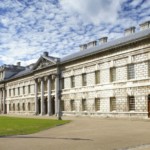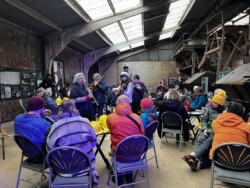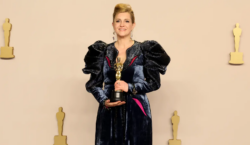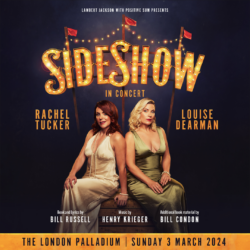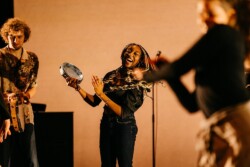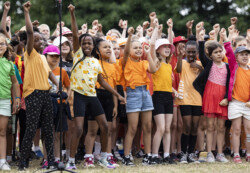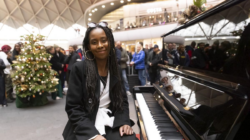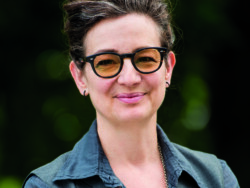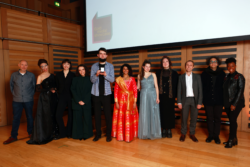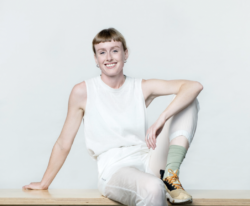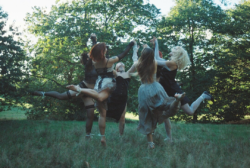Music-making in Cornwall takes centre stage as Trinity Laban unites with the BSO, Tête à Tête, and Carn to Cove to bring to life a powerful and interactive new chamber opera, Fault Lines.
At a wake in a pub, a storyteller fondly remembers Cornish miner, Joe. Soon, a deeper story emerges about friendship, mischief, tragedy and forces more powerful than man.
Fault Lines is a brand-new musical interpretation, a haunting yet playful story told through music and song inspired by folklore, home, mining, memories, and mischief. With music by Luke Styles and words by Hazel Gould, Fault Lines is a BSO production in association with Trinity Laban and Tête à Tête, presented as part of Carn to Cove’s rural touring season. Local instrumentalists united with opera singers and BSO musicians in four performances – the audience was warmly invited to join in, sing or play along, or just listen and enjoy the story. Designed for intimate spaces, the piece was staged in non-traditional venues around West Cornwall and was performed in four different locations, spanning across mines and community spaces. The one-act opera was presented as a double bill with a programme rooted in each place including music by local artists, talks and hosted discussions around the ideas and themes of the piece.
Two Trinity Laban vocal students – Robin Hughes (MMus) and Nathan Stubbings (BMus4) – were cast as Joseph/Joe and Giuseppe this newly commissioned opera. The opera was directed by Bill Bankes-Jones (Tête à Tête), conducted by Tom Featherstonhaugh (BSO Assistant Conductor) and performed by a cast of three singers (our two students and a professional singer), plus a small ensemble of Clarinet, Bassoon, Violin and percussion players from the BSO.
Performances took place on:
- 7 March – St Agnes Miners’ and Mechanics’ Institute
- 8 March – Wheal Martyn, St Austell & Kresen Kernow, Redruth
- 9 March – Geevor Tin Mine, Pendeen
About Bournemouth Symphony Orchestra
One of the UK’s best-loved orchestras, Bournemouth Symphony Orchestra is a professional ensemble known for championing the role of culture in people’s lives. Based at Lighthouse, Poole, the Orchestra has residencies in Bristol, Exeter, Portsmouth, Southampton and Yeovil, and performs regularly in Truro, Basingstoke, Barnstaple and Weymouth — it is the largest cultural provider in the South West, serving one of the biggest and most diverse regions in the UK.
Challenging barriers to high-quality music for all, the BSO leads hundred of community-based events each year, from its award-winning work in health and care settings to partnership with schools and music education hubs – and in the 2023/23 season the Orchestra will welcome its next community-based BSO Young Associate musicians. Following international attention for igniting change, BSO Resound – the world’s first professional disabled-led ensemble at the core of a major orchestra, and winner of the 2019 Royal Philharmonic Society’s Impact Awards – continues to challenge perceptions.
The Orchestra, under its Chief Conductor Kirill Karabits, is known for pushing artistic boundaries, and its ongoing series of music from former Soviet states, Voices from the East, continues to gain praise. Boasting an enviable list of principal conductors, including Marin Alsop, the first female principal conductor of a major UK orchestra, the BSO has given memorable performances worldwide and the regular live broadcasts on BBC Radio 3 and Classic FM.
The Orchestra’s livestreamed broadcasts have cemented its reputation for presenting live symphonic music of the highest quality; its digital performances remain popular around the globe, reaching around 900 regular online viewers for each performance. In 2023/24, the series features guest artists Alina Ibragimova, Sunwook Kim and Awadagin Pratt alongside a host of the UK’s leading music broadcasters. The former winner of the Tchaikovsky Competition for Young Musicians, pianist Alexander Malofeev also features, when he becomes the Orchestra’s Artist-in-Residence following popular appearances in recent seasons.
Committed to new music, the BSO has presented premiere performances of works by Carmen Ho, Franghiz Ali-Zadeh, Magnus Lindberg, Anna Korsun, Elizabeth Ogonek and Shirley J. Thompson OBE in recent years.
The BSO’s Principal Broadcast Partner is BBC Radio 4.
The BSO is Classic FM’s Orchestra in the South of England.

